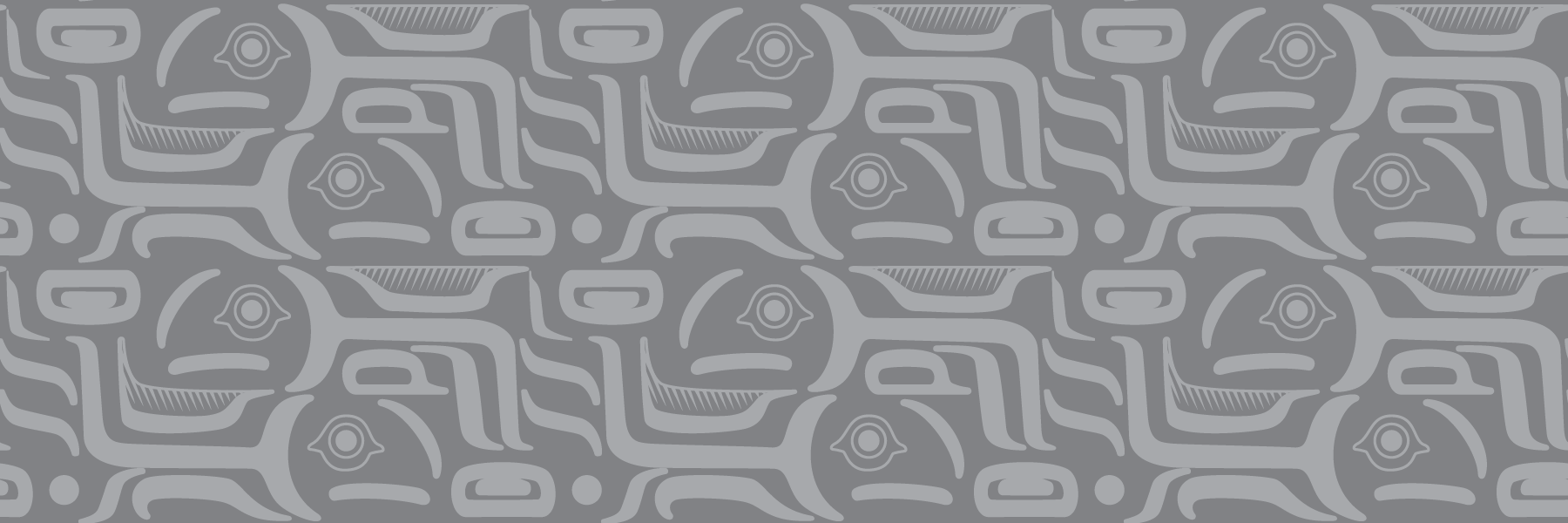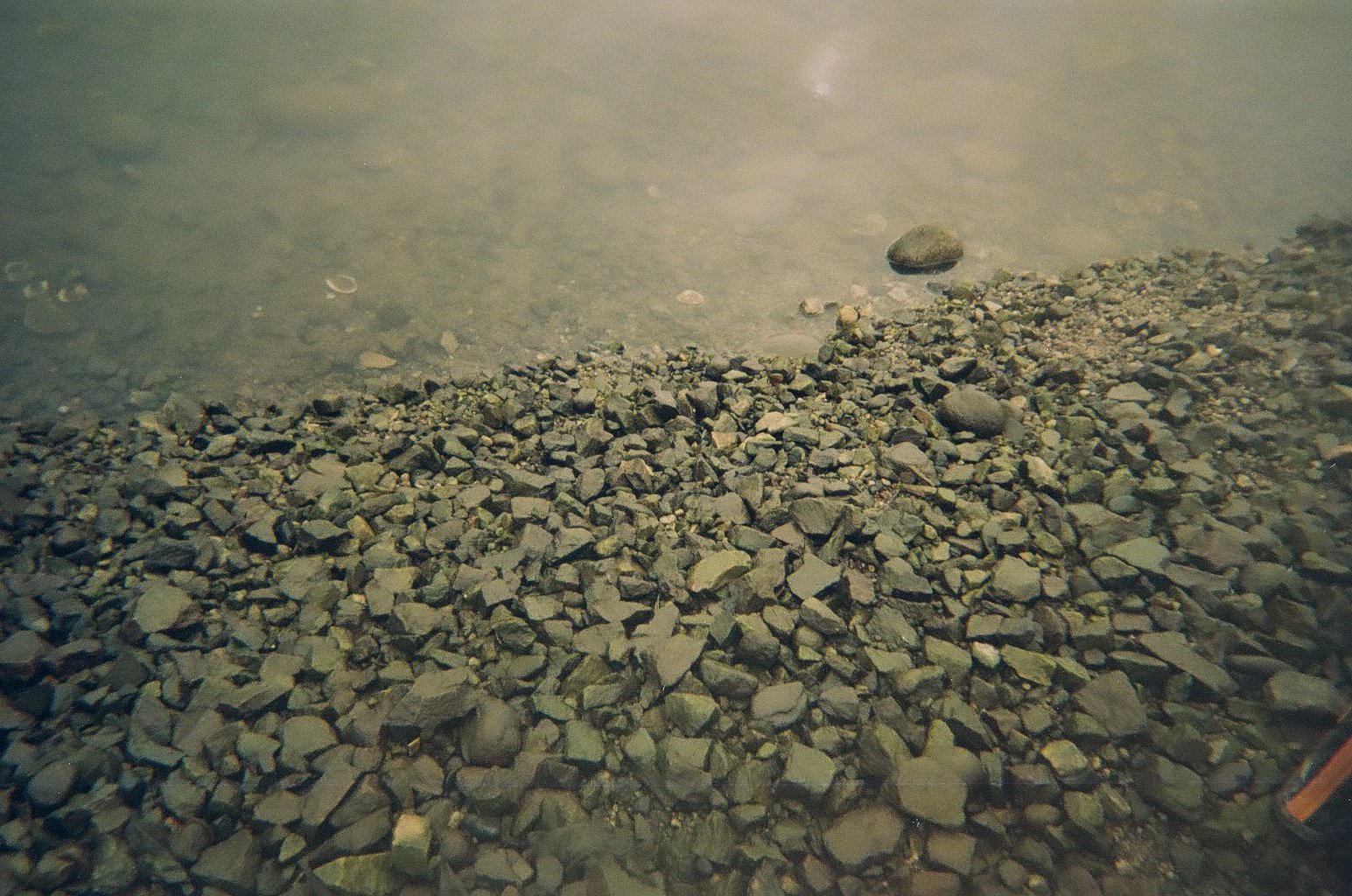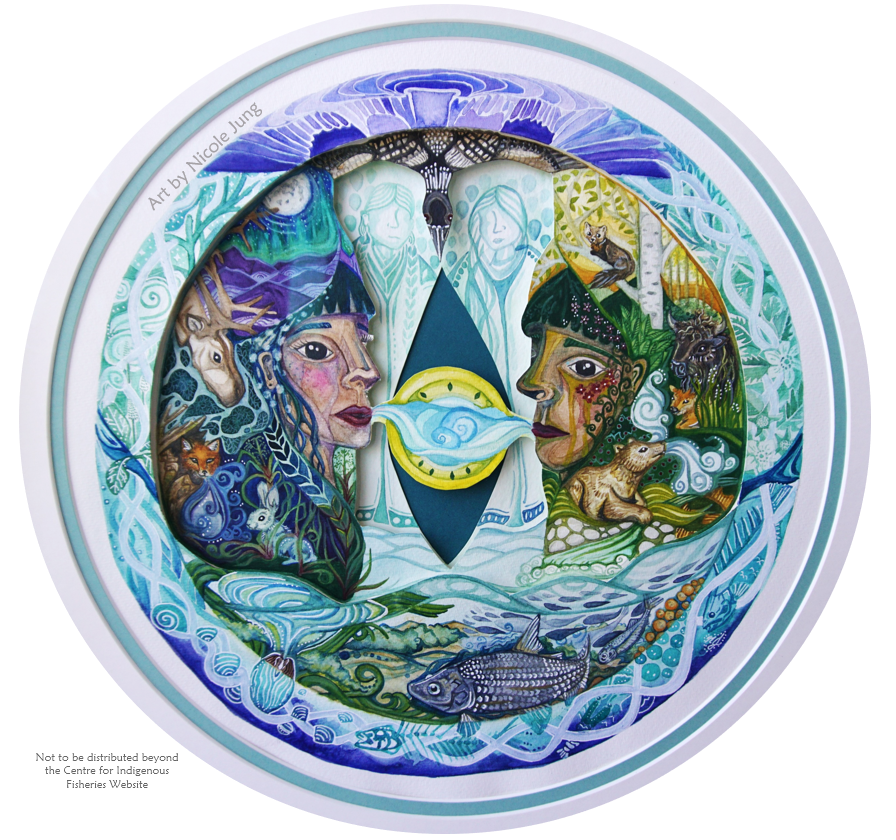
Writing & Story
We believe stories matter. And yet academic literature oftentimes fails to tell the stories held by Indigenous Peoples, or else tells these stories without the involvement of Indigenous Peoples themselves. While we address many different topics and contexts through our writing, we collectively aim to co-create written works that dismantle these inequalities. We do so through actions such as co-authoring manuscripts with our partners, prioritizing open access publication, and respecting Indigenous data sovereignty.
Here, we participate in the movement to re-write the narrative about aquatic sustainability and management.
Featured Quotes & Articles
“[CIF] Students develop independently as well as collectively, receiving context-specific training and research support through these interactions… It is through this multi-layered mentorship model, which will soon be bolstered by an Indigenous Advisory Council for the CIF (launching in 2022), that student training needs are fulfilled to become well-rounded, highly skilled, and independent yet deeply collaborative researchers that are needed to solve the problems we face today.”
— Nyboer et al., 2022 | Box 2: A case study on reimagining lab hierarchies
“Not only would it behoove fisheries scientists to use all and the best tools and knowledge available at this time of [social-ecological] crisis, irrespective of their origin and the perceived objectivity and superiority of Western scientific approaches, but this would importantly serve decolonial and reconciliatory efforts that help rectify uneven power relations, knowledge inequalities, and other racially linked and unjust dynamics in fisheries.”
— Reid et al., 2020 | “Two-Eyed Seeing”: An Indigenous framework to transform fisheries research and management
“We may not be tearing down skyscrapers or altering the physical landscape of Vancouver in any way, but by engaging Indigenous place names I believe that we can ‘[alter] the landscape in [our] memory’ and so work to envision decolonial realities for this city”
— Jung, 2022 | BC Studies Review of Indigenous Cities

All Writing Listed by Article Type
-
2024
Jared W. H. Connoy, Gillian Rourke, Sarah Knude, Richard Dewhurst, Dalyce Huot & Steven M. Vamosi. 2024. Studying Chinook salmon in northern river ecosystems through ecological methods and Indigenous, Teslin Tlingit knowledge. Communications Biology. https://doi.org/10.1038/s42003-024-07300-4 [OPEN ACCESS].
Pedro C. González-Espinosa, Lauren Jarvis, Sara Cannon, Andrés M. Cisneros-Montemayor, Gerald G. Singh, Ridhee Gupta & Eva C. Enders. 2024. Quantifying the Interactions and Cumulative Effects of Multiple Stressors on Salmonids. Environmental Management. https://doi.org/10.1007/s00267-024-02102-0.
Cannon, S.E., Moore, J.W., Adams, M.S., Degai, T., Griggs, E., Griggs, J., Marsden, T., Reid, A.J., Sainsbury, N., Stirling, K.M., Barnes, A.A.Y.S., Benson, R., Burrows, D., Chamberlin, G.R., Charley, B., Dick, D., Duncan, A.T., Liddle, K.K.M., Paul, M., Prince, N.P., Scotnicki, C., Speck, K., Squakin, J., Van Der Minne, C., Walkus, J., West, K., Wilson, K.B., The Indigenous Data Sovereignty Workshop Collective, 2024. Taking care of knowledge, taking care of salmon: towards Indigenous data sovereignty in an era of climate change and cumulative effects. FACETS 9, 1–21. https://doi.org/10.1139/facets-2023-0135
Febria C, AJ Reid. 2024. Liboiron, M. 2021. Pollution is Colonialism. Duke University Press: Durham, NC. ISBN 9781478014133 (Paper). 216 p. US$25.95. Limnology and Oceanography Bulletin. http://doi.org/10.1002/lob.10619.
Reid AJ, DA McGregor, AK Menzies, LE Eckert, CM Febria, JN Popp. 2024. Ecological research ‘in a good way’ means ethical and equitable relationships with Indigenous Peoples and Lands. Nature Ecology and Evolution. https://doi.org/10.1038/s41559-023-02309-0.
2023
Santos CF, T Agardy, D Aheto, EH Allison, NJ Bennett, JL Blythe, H Calado, LB Crowder, JC Day, A de Vos, W Flannery, I Galparsoro, E Gissi, KM Gjerde, JF Gobin, S Green, M Isaacs, ST Karuaihe, AT Lombard, PFM Lopes, E Ojea, M Orbach, G Pecl, AJ Reid, M Scherer, AJ Shelton, TO Sogbanmu, S Villasante, K Wedding, UR Sumaila. 2023. Advancing interdisciplinary knowledge for ocean sustainability. npj Ocean Sustainability. https://doi.org/10.1038/s44183-023-00026-6 [OPEN ACCESS].
Muir AM, AT Duncan, K Almack, N Boucher, ES Dunlop, C Febria, JT Ives, R Lauzon, H Lickers, WP Mattes, D McGregor, H McGregor, AJ Reid. 2023. Sharing across the space: Introduction to a special issue on Bridging Indigenous and non-Indigenous knowledge systems. Journal of Great Lakes Research. https://doi.org/10.1016/j.jglr.2023.04.001 [OPEN ACCESS].
Duncan AT, R Lauzon, C Harpur. 2023. An investigation into Saugeen Ojibway Nation based ecological knowledge on the ciscoes (Coregonus spp.) of Lake Huron. Journal of Great Lakes Research. https://doi.org/10.1016/j.jglr.2023.02.004 [OPEN ACCESS].
Almack K, AT Duncan, R Lauzon, R Dunlop. 2023. Building trust through the Two-Eyed Seeing Approach to Joint Fisheries Research. Journal of Great Lakes Research. https://doi.org/10.1016/j.jglr.2022.11.005 [OPEN ACCESS].
Stirling KM, K Almack, N Boucher, AT Duncan, AM Muir, JWH Connoy, RJ Lauzon, KJ Mussett, C Nonkes, N Vojno, AJ Reid. 2023. Experiences and Insights on Bridging Knowledge Systems between Indigenous and non-Indigenous Partners: Learnings from the Laurentian Great Lakes. Journal of Great Lakes Research. https://doi.org/10.1016/j.jglr.2023.01.007 [OPEN ACCESS].
Nonkes C, AT Duncan, R Lauzon, K Ryan, AJ Reid, SJ Cooke, N Young. 2023. Two-Eyed Seeing: Developing perspective and wisdom on sea lamprey in the Laurentian Great Lakes. Journal of Great Lakes Research. https://doi.org/10.1016/j.jglr.2023.03.001 [OPEN ACCESS].
Mussett KJ, SB Chiblow, D McGregor, R Whitlow, R Lauzon, K Almack, N Boucher, AT Duncan, AJ Reid. 2023. Wise practices: Indigenous-settler relations in Laurentian Great Lakes fishery governance and water protection. Journal of Great Lakes Research. https://doi.org/10.1016/j.jglr.2022.09.010 [OPEN ACCESS].
Birnie-Gauvin K, AJ Lynch, P Franklin, AJ Reid, S Landsman, D Tickner, J Dalton, SJ Cooke, K Aarestrup. 2023. The RACE for freshwater biodiversity: Essential actions to create the social context for meaningful conservation. Conservation Science and Practice. http://doi.org/10.1111/csp2.12911 [OPEN ACCESS].
2022
Turner N, AJ Reid. 2022. "When the wild roses bloom": Indigenous knowledge and environmental change in northwestern North America. GeoHealth. https://doi.org/10.1029/2022GH000612 [OPEN ACCESS].
Gobin J, AT Duncan, R Lauzon. 2022. Saugeen Ojibway Nation community input and action: Initiating a two-eyed seeing approach for dikameg (Coregonus clupeaformis) in Lake Huron. Journal of Great Lakes Research. https://doi.org/10.1016/j.jglr.2022.10.010 [OPEN ACCESS].
Nyboer B, AJ Reid, A Jeanson, R Kelly, M Mackay, J House, SM Arnold, PW Simonin, MGC Sedanza · ED Rice, TE Angela, L Quiros, A. Pierucci, K Ortega‐Cisneros, JN Nakamura, V Melli, S Mbabazi · MSL Martins, ABB Ledesma, C Obregón, CK Labatt, AN Kadykalo, M Heldsinger, ME Green, JL Fuller, M Franco‐Meléndez, MJ Burnett, JA Bolin, S Andrade‐Vera, SJ Cooke. 2022. Goals, challenges, and next steps in transdisciplinary fisheries research: perspectives and experiences from early-career researchers. Reviews in Fish Biology and Fisheries. https://doi.org/10.1007/s11160-022-09719-6 [OPEN ACCESS].
Reid JL, JN Bergman, AN Kadykalo, JJ Taylor, WM Twardek, T Rytwinski, AD Chhor, A Frempong-Manso, AL Martel, NWR Lapointe, JR Bennett, VM Nguyen, AJ Reid, J Marty, SA Robinson, DAR Drake, AK Winegardner, I Gregory-Eaves, MK Taylor, IF Creed, JP Smol, CM O’Connor, SJ Cooke. 2022. Developing an evidence-based toolbox for addressing freshwater biodiversity threats. Biological Conservation. 269: https://doi.org/10.1016/j.biocon.2022.109533.
Elmer LK, DL Moulton, AJ Reid, AP Farrell, DA Patterson, B Hendriks, SJ Cooke, SG Hinch. Accepted. Thermal selection and delayed migration by adult sockeye salmon (Oncorhynchus nerka) following escape from simulated in-river fisheries capture. Fisheries Research. 251: https://doi.org/10.1016/j.fishres.2022.106321.
Reid AJ, N Young, S Hinch, SJ Cooke. 2022. Learning from Indigenous knowledge holders on the state and future of wild Pacific salmon. FACETS. 7: 718–740. https://doi.org/10.1139/facets-2021-0089 [OPEN ACCESS].
2021
Jung NJ. 2021. Altering the Landscape of our Memories: A Review of Indigenous Cities (Vancouver) [Media Review of Indigenous Cities: The Stories Here by NAC Indigenous Theatre, Savage Society, and Gordon Tootoosis Nikaniwin Theatre] BC Studies, 211, pp.130-133. https://bcstudies.com/new_media_review/altering-the-landscape-of-our-memories-a-review-of-indigenous-cities-vancouver/ [OPEN ACCESS].
Desforges JE, J Clarke, EJ Harmsen, AM Jardine, JA Robichaud, S Serré, P Chakrabarty, JR Bennett, DE Hanna, JP Smol, T Rytwinski, JJ Taylor, AL Martel, AK Winegardner, J Marty, MK Taylor, CM O’Connor, SA Robinson, AJ Reid, IF Creed, I Gregory-Eaves, NWR Lapointe, SJ Cooke. 2021. The alarming state of freshwater biodiversity in Canada. Canadian Journal of Fisheries and Aquatic Sciences. 00: 1–14. http://doi.org/10.1139/cjfas-2021-0073 [OPEN ACCESS].
Harper M, HS Mejbel, D Longert, R Abell, TD Beard, JR Bennett, SM Carlson, W Darwall, A Dell, S Domisch, D Dudgeon, J Freyhof, I Harrison, KA Hughes, SC Jahnig, JM Jeschke, R Landsdown, M Lintermans, AJ Lynch, HMR Meredith, S Molur, JD Olden, SJ Ormerod, H Patricio, AJ Reid, A Schmidt-Kloiber, M Thieme, D Tickner, E Turak, OLF Weyl, SJ Cooke. 2021. Twenty-five essential research questions to inform the protection and restoration of freshwater biodiversity. Aquatic Conservation: Marine and Freshwater Ecosystems. 31: 2632–2653. http://doi.org/10.1002/aqc.3634.
Cooke SJ, E Nyboer, A Bennett, A Lynch, D Infante, I Cowx, D Beard, D Bartley, C Paukert, AJ Reid, S Funge-Smith, E Gondwe, E Kaunda, J Koehn, N Souter, G Stokes, L Castello, N Leonard, C Skov, S Berg, W Taylor. 2021. The ten steps to responsible inland fisheries in practice: Reflections from diverse regional case studies around the globe. Reviews in Fish Biology and Fisheries. 31: 843–877. https://doi.org/10.1007/s11160-021-09664-w.
Cooke SJ, VW Nguyen, N Young, AJ Reid, DG Roche, N Bennett, T Rytwinski, JR Bennett. 2021. Contemporary authorship guidelines fail to recognize diverse contributions in conservation science research. Ecological Solutions and Evidence. 2: 12060. https://doi.org/10.1002/2688-8319.12060 [OPEN ACCESS].
Twardek WM, EA Nyboer, D Tickner, CM O’Connor, NWR Lapointe, MK Taylor, I Gregory-Eaves, JP Smol, AJ Reid, IF Creed, VM Nguyen, AK Winegardner, JN Bergman, JJ Taylor, T Rytwinski, AL Martel, AR Drake, SA Robinson, J Marty, JR Bennett, SJ Cooke. 2021. Mobilizing practitioners to support the Emergency Recovery Plan for freshwater biodiversity. Conservation Science and Practice. 3: 467. http://doi.org/10.1111/csp2.467 [OPEN ACCESS].
Reid AJ, LE Eckert, JF Lane, N Young, SG Hinch, CT Darimont, SJ Cooke, NC Ban, A Marshall. 2021. “Two‐Eyed Seeing”: An Indigenous framework to transform fisheries research and management. Fish and Fisheries. 22: 243–261. https://doi.org/10.1111/faf.12516 [OPEN ACCESS].
Cooke SJ, AJ Lynch, JJ Piccolo, JD Olden, AJ Reid, SJ Ormerod. 2021. Stewardship and management of freshwater ecosystems – from Leopold’s land ethic to a freshwater ethic. Aquatic Conservation: Marine and Freshwater Ecosystems. 31: 1499–1511. https://doi.org/10.1002/aqc.3537.
Buxton RT, JR Bennett, AJ Reid, C Shulman, SJ Cooke, CF Francis, E Nyboer, G Pritchard, A Binley, S Avery-Gomm, NC Ban, KF Beazley, E Bennett, LK Blight, LE Bortolotti, AF Camfield, Z Gadallah, AL Jacob, I Naujokaitis-Lewis, C Raudsepp-Hearne, DG Roche, F Soulard, D Stralberg, KD Sadler, KA Solarik, CD Ziter, J Brandt, C McKindsey, DA Greenwood, PC Boxall, CF Ngolah, KMA Chan, D Lapen, S Poser, J Girard, C DiBacco, S Hayne, D Orihel, DW Lewis, D Littlechild, SJ Marshall, L McDermott, R Whilow, D Browne, J Sunday, PA Smith. 2021. Key information needs to move from knowledge to action for biodiversity conservation in Canada. Biological Conservation. 256: 108983. https://doi.org/10.1016/j.biocon.2021.108983 [OPEN ACCESS].
2020 & Earlier Publications
By Dr. Andrea Reid available here.
By Dr. Dianne Newell here.
-
Reid AJ, NC Ban. 2025. Accepted. Indigenous leadership is essential to conservation: examples from coastal British Columbia. Navigating Our Way to Solutions in Marine Conservation. LB Crowder, Ed. Open Book Publishers. [Open Access].
Cooke SJ, R Castañeda, AJ Reid, AT Duncan, CT Hasler, J Brownscombe, A Howarth, ML Piczak, SJ Kerr, ML Jones, JM Casselman, JG Imhof, NE Mandrak. 2023. Freshwater Fisheries Resources and Management: Canadian Contexts. Freshwater Fisheries in Canada: Historical and Contemporary Perspectives on the Resources and Their Management. CT Hasler, JG Imhof, NE Mandrak, SJ Cooke, Eds. American Fisheries Society Press.
Harrison HL, AT Duncan, R Lauzon. In Review. Last boat on the lake? Stories of opportunities, challenges, and resilience in Great Lakes small-scale commercial fisheries. In Andrews, EJ, Daly, J, Knott, C. (Eds.), Thinking big about small-scale fisheries in Canada. Too Big To Ignore E-Book.
Duncan AT, R Lauzon. In Review. Two-Eyed Seeing and fisheries governance: The Saugeen Ojibway Nation perspective. In Andrews, EJ., Daly, J, Knott, C. (Eds.), Thinking big about small-scale fisheries in Canada. Too Big To Ignore E-Book.
McGregor D, J Popp, AJ Reid, A Marshall, M Sritharan. 2023. Etuaptmumk / Two-Eyed Seeing and Reconciliation with Earth. Transformative Politics of Nature: Overcoming Barriers to Conservation in Canada. A Olive, K Beazley, C. Finegan, Ed. University of Toronto Press.
Duncan AT, AJ Reid. 2022. Lamprey of North America. Imperiled: The Encyclopedia of Conservation. Elsevier. 602-613. https://doi.org/10.1016/B978-0-12-821139-7.00067-2.
-
Stirling K. 2023. From Ethics to Genetics in Aquatic Ecology: Process is Key. Master’s Thesis, University of British Columbia.
Mussett K. 2023. Co-creating a biocultural indicator framework for fish and fish habitat with Lower stal̕əw (Fraser River) region First Nations. Master’s Thesis, University of British Columbia.
Van Der Minne C. 2023. An Assessment of Zooplankton in Four Salmon-bearing Estuaries Across Clayoquot Sound. Honours Thesis, University of British Columbia.
Jung NJ. 2022. What If Nuu-chah-nulth Worldviews Informed Our Visions of Rockfish Stewardship? Assessing Rockfish (Sebastes spp.) Size and Age Trends in Nuu-chah-nulth Territories. Honours Thesis, University of British Columbia.
-
First Nations Fisheries Legacy Fund and the Centre for Indigenous Fisheries. 2024. Implementing Biocultural Frameworks for Water and Fish Habitat Assessment: Recommendations Paper for the Canadian and British Columbian Governments. https://fnfisherieslegacy.ca/our-projects/developing-a-bio-cultural-framework-with-the-lower-fraser-water-roundtable/
First Nations Fisheries Legacy Fund and the Centre for Indigenous Fisheries. 2024. Bicultural Indicator Manual: A Guide for the Development and Implementation of Biocultural Indicator Frameworks. https://fnfisherieslegacy.ca/our-projects/developing-a-bio-cultural-framework-with-the-lower-fraser-water-roundtable/
Reid AJ (Contributing Author) et al. 2022. Living Planet Report 2022 – Building a nature positive society. Almond, R.E.A., Grooten, M., Juffe Bignoli, D. & Petersen, T. (Eds). WWF, Gland, Switzerland. https://livingplanet.panda.org/
Cannon S & AJ Reid (Contributors). 2022. The Watershed Futures Initiative (2022) Indigenous Data Sovereignty in Salmon Watersheds Toolkit. https://www.watershedfuturesinitiative.com
W̱SÁNEĆ Fishers, J Olsen, S Johnson, L Eckert, AJ Reid, NJ Jung. 2022. Envisioning W̱SÁNEĆ fisheries in two worlds: Listening to the stories and experiences of fishers. Internal Community Report.
Duncan AT, C Akiwenzie, B Redford. 2021. Saugeen Ojibway Nation data collection manual – Together with Giigoonyag research initiative. Chippewas of Nawash Unceded First Nation. Internal Community Report.
Duncan AT. 2021. Together with Giigoonyag Committee Policy. Chippewas of Nawash Unceded First Nation. Internal Community Report.
Chamberlin B, AJ Reid, S Barnes, J Housty, J Walkus. 2021. Indigenous Stewardship of Salmon Watersheds Webinar 1: Sharing Stories on Climate Change and Cumulative Effects. https://www.watershedfuturesinitiative.com/_files/ugd/54efec_d58009e2a8984d1888bce6369a3f94dc.pdf.
-
Reid AJ and Hanna D. 2025. Youth are charting new freshwater futures by learning from the water on the water. https://theconversation.com/youth-are-charting-new-freshwater-futures-by-learning-from-the-water-on-the-water-250987
Cannon SE, Duncan AT and Sainsbury N. 2024. Indigenous data sovereignty can help save British Columbia’s wild salmon. http://theconversation.com/indigenous-data-sovereignty-can-help-save-british-columbias-wild-salmon-229564
Reid AJ. 2022. Learning from Indigenous knowledge holders on the state and future of wild Pacific salmon. https://theconversation.com/learning-from-indigenous-knowledge-holders-on-the-state-and-future-of-wild-pacific-salmon-182411.
Boucher N, K Almack, AT Duncan, AJ Reid. 2021. IAGLR session explores ‘Seeing with Both Eyes’ through Indigenous Knowledge and Western science. Great Lakes Connection Newsletter, International Joint Commission. https://www.ijc.org/en/iaglr-session-explores-seeing-both-eyes-through-indigenous-knowledge-and-western-science.
Buxton R, AJ Reid, J Bennett, PA Smith. 2021. Respect for Indigenous knowledge must lead nature conservation efforts in Canada. The Conversation Canada. https://theconversation.com/respect-for-indigenous-knowledge-must-lead-nature-conservation-efforts-in-canada-156273.
-
Reid AJ. 2022. Indigenous Perspectives. Pacific Salmon Field Guide. Sean Godwin and Martin Krkosek. Lone Pine Publishing. https://www.canadabookdistributors.com/pacific-salmon/
-
Fish Outlaws. 2024. https://www.fishoutlaws.net/
International Indigenous Salmon Peoples Gathering. 2023. https://www.iispg.com/
Why We Do More Than Write
Children, elders, and community members are knowledge holders too! But academic writing may not be appropriately reflective of their knowledges nor readily accessible to these groups of people. It is important to us that all knowledge holders can interact with the works we co-produce, and that we represent Indigenous knowledges in ways that express their interconnectedness with Indigenous worldviews, stewardship practices, and lived experiences.
(Re) visit our Artwork page and/or read about our Foundational Initiatives (on our About Us page) to learn more about how our engagements with communities have moved beyond written words.

Photo Credits & Gratitude: We hold our hands up in thanks to Alex Duncan, Nicole Jung, Lydia Nagai, and Kate Mussett.









